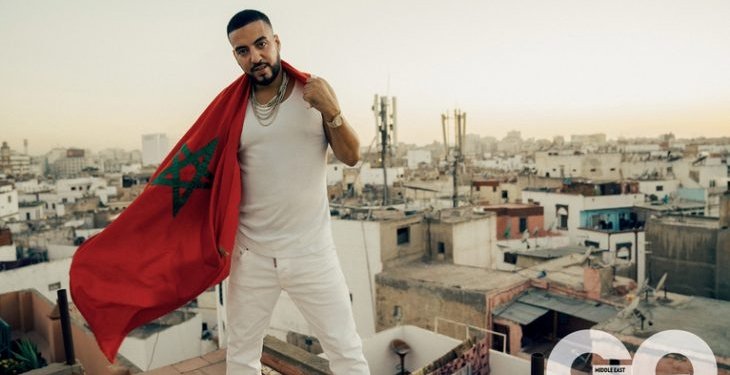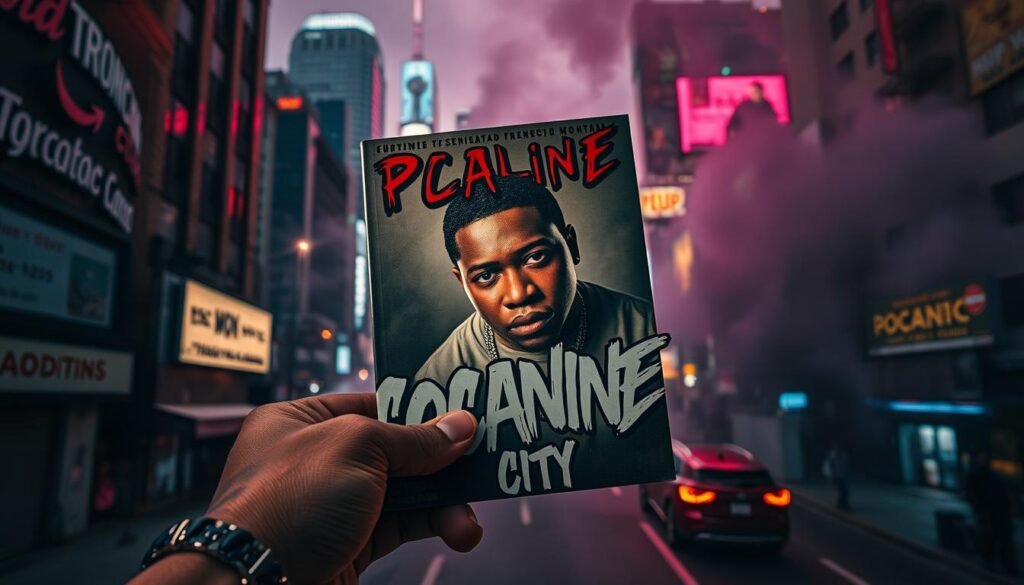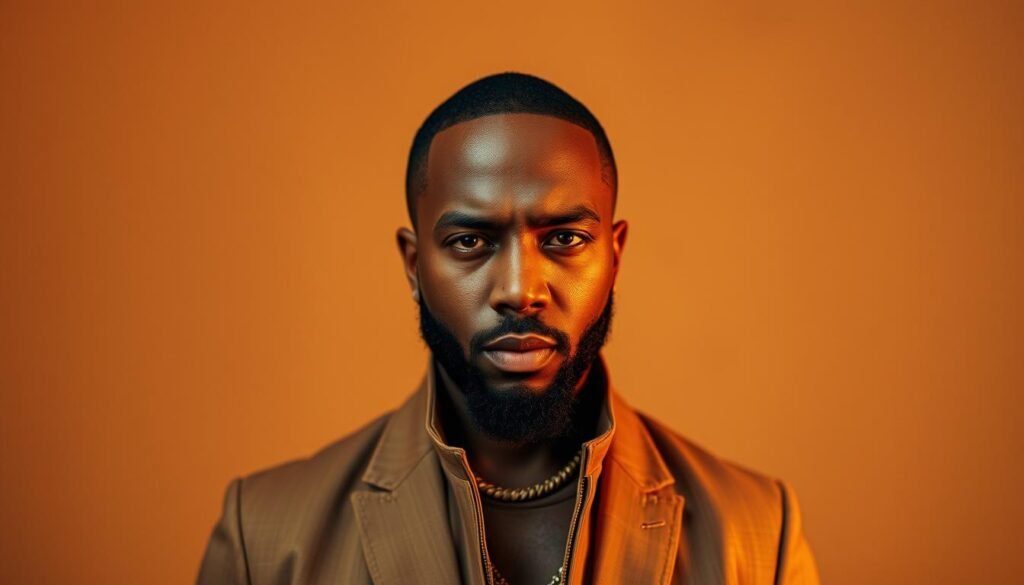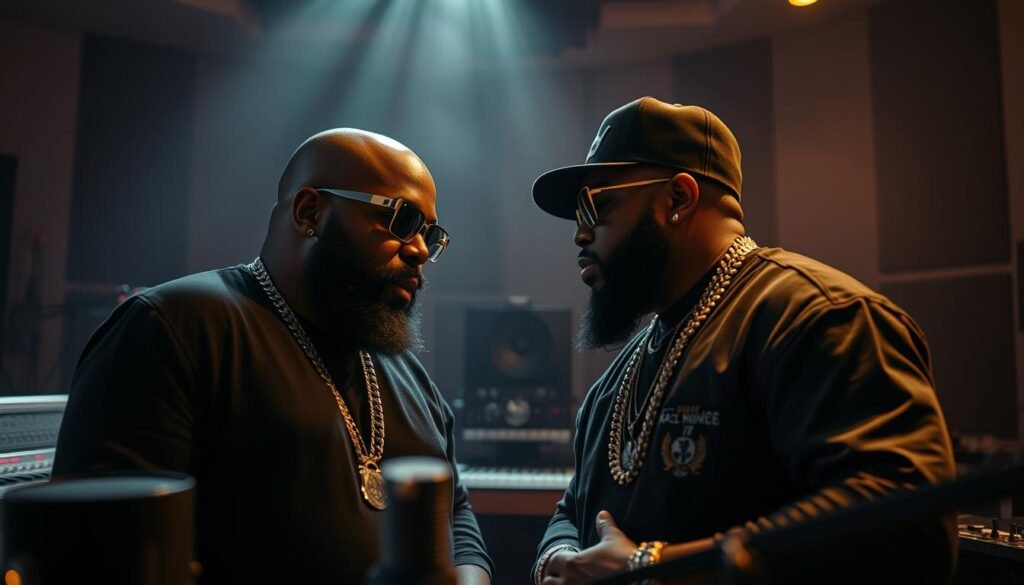Few artists bridge cultures as effortlessly as the Moroccan-American rapper who rose to fame in the early 2000s. With a career spanning over two decades, his unique blend of African roots and New York swagger redefined hip-hop’s global appeal.
Born Karim Kharbouch, this chart-topping artist carved his path through relentless mixtape releases before breaking into mainstream music. His diamond-certified hit “Unforgettable” became an anthem, proving international artists could dominate U.S. charts while staying true to their heritage.
Beyond music, he played a pivotal role in reviving New York’s rap scene through collaborations with Bad Boy Records and Maybach Music Group. His journey from Casablanca streets to Billboard charts showcases the evolving face of modern hip-hop.
Key Takeaways
- Moroccan-born artist who revolutionized U.S. hip-hop culture
- Diamond-certified single “Unforgettable” as career milestone
- Key figure in New York rap’s 2010s resurgence
- Successfully blended African and American musical influences
- 20+ year career with consistent chart performance
Who Is French Montana? A Brief Introduction
A young immigrant’s struggle to adapt in the Bronx shaped one of rap’s most distinct voices. Born Karim Kharbouch in Casablanca Morocco, he arrived in New York City at 13, speaking only French and Arabic. His early years were marked by poverty, with a single mother raising three children on welfare.
From Casablanca to The Bronx: Early Roots
The transition from North Africa to America wasn’t easy. He learned English through hip-hop culture, using music to bridge the gap between his heritage and his new home. The streets of the South Bronx became his classroom, where he absorbed the rhythms and rhymes that would define his career.
Stage Name Origins and Cultural Identity
His early battle rap persona, “Young French,” nodded to his Francophone roots. Later, he evolved into “French Montana,” merging French colonial history with American symbolism. This duality shines in his music, where Arabic lyrics meet global collaborations, celebrating his immigrant journey.
French Montana: The Rise of a Hip-Hop Star
From street DVDs to chart-topping anthems, his grind set a blueprint for underground success. Long before streaming, he captured raw hip-hop culture through Cocaine City—a DVD series blending music videos and street interviews. Launched in 2002, these tapes became essential viewing, predating YouTube’s dominance.
Cocaine City DVDs and Underground Beginnings
The Cocaine City series spanned 14 volumes by 2010, showcasing unreleased tracks and Bronx street life. A 2003 studio shooting nearly ended his career, but he returned stronger. Partnering with producer Harry Fraud, he dropped mixtapes that fused New York grit with melodic hooks.
The Breakthrough: “Shot Caller” and Mainstream Attention
Everything changed with “Shot Caller” in 2011. The remix featuring Diddy and Rick Ross topped NYC radio charts. This led to a Bad Boy Records deal, proving his decade-long hustle paid off. XXL’s 2012 Freshman Class nod finally cemented his place among hip-hop’s elite.
Early Life and Career Struggles
The journey from immigrant teen to hip-hop star wasn’t paved with gold, but raw talent and relentless hustle. By 16, Karim Kharbouch became the primary provider for his mother and two brothers in Bronx housing projects. Those $500 checks from Cocaine City DVD sales meant more than creative expression—they kept the lights on.
Immigrant Journey and Adapting to NYC
Attending both Roosevelt and Lehman High Schools, the young artist balanced education with survival jobs. The New York grind shaped his worldview—flipping Arabic phrases into rap bars while studying local legends like Big Pun. Every dollar earned went straight to family expenses, making early music video shoots both artistic and financial gambles.
His 2007 debut mixtape French Revolution Vol 1, featuring Tony Yayo, marked a turning point. The project blended Moroccan heritage with Bronx swagger, proving immigrant stories could resonate in hip-hop. Still, paychecks remained inconsistent until the DVD hustle took off.
Battle Rapping and Building a Name
Harlem’s Fight Klub became his proving ground, where battle rapping skills earned neighborhood respect. These verbal showdowns forced him to sharpen flows and develop the charismatic delivery that later defined hits. The “Young French” persona emerged here—a bridge between his Francophone roots and American ambitions.
By 2009, collaborations with Akon tested his balance between mainstream appeal and street credibility. The stage name “French Montana” finally crystallized, merging colonial history with aspirational imagery. This duality would later fuel global hits, but first came years of New York pavement-pounding.
Those early music video appearances in Cocaine City DVDs weren’t glamorous—just raw documentation of hustle. Yet they captured the authenticity that eventually attracted Bad Boy Records. Every grainy frame showed an artist building his name the hard way.
Breakthrough Mixtapes and Collaborations
Strategic collaborations and raw mixtapes laid the foundation for a rap career that would shake the industry. The late 2000s saw a perfect storm of creative partnerships, with underground releases gaining cult status through word-of-mouth buzz.
Coke Wave Series with Max B
The coke wave movement began in 2009 when Harlem rapper Max B took a young artist under his wing. Their first collaborative tape blended soul samples with gritty street narratives, creating a blueprint for New York’s mixtape renaissance.
Max B’s mentorship extended beyond music—he shared branding strategies that turned the “Coke” motif into a lifestyle. This philosophy later birthed the coke boys collective, uniting artists like Chinx Drugz and Cheeze under one banner.
Mac & Cheese Mixtapes: Cult Following
Producer Harry Fraud brought cinematic flair to the mac cheese series, starting in 2009. These tapes stood out with soulful beats and A-list features, including Wiz Khalifa on Volume 2’s standout track.
The series became a masterclass in strategic collaborations. Nicki Minaj’s appearance on “Coke Wave 2” and Waka Flocka Flame’s explosive “Choppa Choppa Down” remix showed how mixtapes could rival commercial albums.
By 2010, mac cheese downloads surpassed 500k, proving independent releases could drive careers forward. This success inspired a generation of artists to treat mixtapes as career launchpads rather than just promotional tools.
Signing to Bad Boy and Maybach Music Group
The music industry witnessed a rare triple-label deal in 2012 that changed hip-hop’s landscape. A partnership between Bad Boy Records, Maybach Music Group, and Interscope Records marked a strategic power move. Negotiated during a Drake tour, this alliance blended New York’s legacy with Southern trap dominance.
Diddy’s Influence and Label Deal
Diddy’s A&R vision fused raw Bronx authenticity with mainstream appeal. His Bad Boy Records deal offered a $2M advance, but with 360-degree complexities. Executive producing the debut album Excuse My French, he pushed for hits that honored NYC’s rap revival.
The contract terms reflected industry shifts—artist royalties versus label control. Yet, the deal’s prestige revitalized Bad Boy Records post-Dipset era, proving hip-hop’s hunger for cross-regional collaborations.
Joint Venture with Rick Ross
Rick Ross’s Maybach Music Group expanded the artist’s Southern footprint. Tracks like “Pop That” leveraged Ross’s Miami basslines, creating chart-topping hybrids. The label’s street empire balanced Bad Boy Records’ polished legacy.
This dual allegiance wasn’t without politics. Navigating Maybach Music Group’s gritty branding while honoring Bad Boy Records’ pop sensibilities required finesse. The Interscope Records backing ensured global distribution, sealing hip-hop’s first major three-label pact.
Notable Albums and Critical Reception
Chart success and critical reception tell two different stories for this hip-hop heavyweight. Each studio release blended street credibility with mainstream ambition, though not all landed equally with reviewers.
Excuse My French (2013): Debut Studio Album
Excuse My French arrived with a #4 debut on the Billboard 200, backed by the anthemic “Pop That.” The track united Drake, Rick Ross, and Lil Wayne for a club banger that dominated summer 2013.
Critics were less kind. A 58 Metacritic score highlighted its formulaic traps, though fans celebrated its unapologetic energy. The album’s raw NYC revivalism clashed with expectations for polished crossover hits.
Jungle Rules (2017) and Commercial Success
Four years later, Jungle Rules flipped the script. Lead single “Unforgettable” fused Swae Lee’s melodic hooks with African rhythms, peaking at #3 on the Billboard 200.
The album’s global sound—featuring French Montana’s Moroccan roots—marked a creative high. Tracks like “A Lie” with The Weeknd proved his knack for genre-blurring collaborations.
Later Projects: Montana (2019) and They Got Amnesia (2021)
By 2019’s Montana, independence became key. A deal with Epic Records allowed creative control, though streaming-era challenges lingered. 2021’s They Got Amnesia closed the major-label chapter entirely.
Both projects leaned into gritty lyricism over chart trends, cementing his legacy as a bridge between hip-hop’s past and future.
French Montana’s Biggest Hits
Certain tracks define an artist’s legacy, and for this hip-hop star, a handful of anthems cemented his place in music history. With over 40 Billboard entries, his catalog blends street credibility with global appeal. Three records particularly showcase this balance.
“Pop That” ft. Drake, Rick Ross, and Lil Wayne
The 2012 club banger “Pop That” became an instant summer anthem. Featuring rap heavyweights, it peaked at #36 on the Hot 100 while dominating urban radio.
Its success proved the artist could bridge regional scenes. The track’s trunk-rattling bass and champagne-themed lyrics made it a staple in clubs worldwide.
“Unforgettable” ft. Swae Lee: Diamond Certification
No song captures global influence better than the 2017 smash “Unforgettable”. Swae Lee’s melodic hook transformed the track into a crossover phenomenon.
In 2020, it earned diamond certification—a rare feat for African-born artists. The song’s blend of Afrobeat rhythms and trap elements created a new blueprint for international hits.
Other Chart-Topping Singles
Early banger “Ain’t Worried About Nothin” fused Southern hip-hop with NYC grit. Its 2013 success foreshadowed the artist’s genre-blending future.
Unexpected collaborations like “Writing on the Wall” with Post Malone showed versatility. Even older cuts like “Shot Caller” found new life through sports arena playlists and TikTok trends.
These chart-topping moments collectively showcase an artist who mastered both street anthems and global pop appeal.
Iconic Collaborations and Features
No rapper mastered the art of collaboration quite like this global hitmaker. His discography reads like a who’s who of hip-hop, blending New York grit with Southern swagger and pop sensibility.
With Rick Ross and Maybach Music Group
The rick ross partnership became legendary, yielding 40+ tracks including the anthem “Stay Schemin.” Their studio chemistry mixed Ross’ luxurious flow with raw Bronx energy.
As MMG’s flagship collaborator, he helped define the label’s hustler aesthetic. Tracks like “Pop That” proved how well their styles complemented each other on chart-toppers.
Southern Hip-Hop Ties
The 2011 waka flocka flame collab “Lock Out” showcased Brick Squad connections. Even Gucci Mane recorded verses from prison for their mixtapes.
These alliances bridged regional divides long before trap dominated mainstream rap. The Southern influence added bounce to his New York foundation.
Cross-Genre Collaborations
From drake‘s Toronto charm to Mariah Carey’s pop vocals, his features spanned genres. EDM experiments like DJ Snake’s “Lay Up” proved his versatility.
Posthumous DMX verses on 2021’s “They Got Amnesia” showed respect for hip-hop elders. Each collaboration expanded his musical footprint without losing street credibility.
Coke Boys Records and Entrepreneurial Ventures
Beyond music, entrepreneurial vision shaped this artist’s lasting impact on hip-hop culture. The coke boys collective evolved into a full-fledged label, becoming a platform for emerging talent and business ventures.
Founding the Label and Signing Artists
Established in 2012, coke boys records became known for spotting raw talent early. The label signed Chicago’s Lil Durk before his mainstream breakthrough, showcasing an eye for regional stars.
Posthumous releases for Chinx Drugz honored the late rapper’s legacy. However, not all deals succeeded—a $300k advance to Rowdy Rebel during his incarceration became a controversial investment.
Legal challenges emerged, including a $2.2M lawsuit over the “All the Way Up” sample. Trademark disputes around the coke boys brand name revealed the complexities of music entrepreneurship.
Philanthropy and Community Work
The artist’s philanthropy efforts gained equal attention to his business moves. A 2017 partnership with Mama Hope funded a $400k medical center in Uganda, addressing maternal healthcare gaps.
During COVID-19, Bronx food drives demonstrated local charity commitments. These efforts balanced global and community-focused giving.
From courtroom battles to hospital donations, the coke boys era proved hip-hop success could translate into both business and social impact.
Controversies and Legal Battles
Behind the chart-topping success lies a trail of courtroom battles and industry conflicts. The rapper’s career faced multiple legal battles involving contracts, samples, and personal conduct.
Management Lawsuits and Industry Feuds
In 2017, former manager Debra Antney won a $2M lawsuit against the artist. The case revealed complex legal battles over unpaid commissions and contract breaches.
The Mizay Entertainment dispute became another high-profile case. Allegations of unpaid fees and mismanagement led to years of litigation.
A 2020 sexual battery lawsuit was dismissed but added to the list of cases where the artist was montana sued. These incidents highlighted the challenges of navigating hip-hop’s business side.
Shooting Incidents and Personal Challenges
The 2023 Miami video shoot for “Wockesha” turned violent when gunfire injured 10 people. This wasn’t the first shooting incident tied to the rapper’s career.
Earlier in 2013, LAX authorities charged him with firearm possession. The case was settled but reinforced concerns about hip-hop’s dangerous stereotypes.
Ongoing feuds, like the 50 Cent conflict over “I Get Money” samples, showed how legal battles could stem from creative differences. The “All the Way Up” copyright ruling set precedents for future sample clearances.
Through these challenges, the artist maintained his career momentum while navigating hip-hop’s complex legal landscape.
French Montana’s Influence on Hip-Hop
Hip-hop’s cultural landscape shifted when an African-born artist redefined New York’s sound while breaking global appeal records. This unique position allowed him to revive Bronx boom-bap traditions while setting unprecedented streaming records across continents.
Reviving New York Rap in the 2010s
The new york rap revival gained momentum through gritty anthems like “Sanctified” with Kanye West. These tracks blended trap rhythms with classic NYC lyricism, creating a blueprint for the city’s resurgence.
Documentary projects like For Khadija highlighted immigrant struggles that resonated with urban audiences. This authenticity became key to the new york rap revival, connecting street narratives with broader cultural themes.
Breaking Barriers as a Global Artist
With 8 billion+ streams, he became the most-streamed African-born hip-hop artist. The diamond-certified “Unforgettable” proved African influences could dominate American charts while maintaining cultural roots.
Tracks like “Famous” with Adam Levine infused North African instrumentation into pop structures. This approach paved the way for later crossovers by artists like Burna Boy and Rema.
The 2019 Morocco concert with Diplo showcased global appeal through cultural diplomacy. Such events demonstrated hip-hop’s power to bridge continents while setting new commercial benchmarks.
Conclusion: French Montana’s Legacy in Music
Few artists have left such a deep mark on hip hop history while balancing street roots with mainstream success. His journey shows how raw talent and smart collaborations can reshape an entire genre.
The rapper’s cultural impact stretches beyond music. From mixtape hustle to global anthems, he proved immigrant stories belong in hip-hop. Tracks like “Unforgettable” blended African rhythms with American trap, inspiring a new wave of artists.
His legacy includes pioneering mixtape distribution and reviving New York’s rap scene. Even today, younger artists study his blueprint—mixing authenticity with commercial appeal across three hip-hop eras.
Whether through cultural impact or chart records, his influence remains undeniable. The diamond plaques and streaming milestones cement his place in hip hop history as a true innovator.
FAQ
What is French Montana’s real name?
His real name is Karim Kharbouch. He was born in Casablanca, Morocco, before moving to The Bronx, New York.
How did French Montana get his stage name?
The name “French Montana” comes from his Moroccan-French background and admiration for Tony Montana from the movie Scarface.
What was French Montana’s first major hit?
“Shot Caller” (2011) brought him mainstream attention, followed by bigger hits like “Pop That” and “Unforgettable.”
Which labels has French Montana been signed to?
He signed with Bad Boy Records under Diddy and later joined Rick Ross’ Maybach Music Group in a joint venture.
What is French Montana’s most successful song?
“Unforgettable” featuring Swae Lee became a diamond-certified global hit, topping charts worldwide.
What mixtapes helped French Montana gain fame?
The Coke Wave series with Max B and the Mac & Cheese mixtapes built his underground following.
Has French Montana worked with other major artists?
Yes, he’s collaborated with Drake, Rick Ross, Lil Wayne, Waka Flocka Flame, and Swae Lee, among others.
What is Coke Boys Records?
It’s his independent label, founded to promote his music and sign new talent, reinforcing his entrepreneurial hustle.
Has French Montana faced legal issues?
Yes, including lawsuits over management deals and past incidents involving shootings and industry disputes.
How has French Montana impacted hip-hop?
He helped revive New York rap in the 2010s and bridges global hip-hop as an African-born artist in the U.S.






